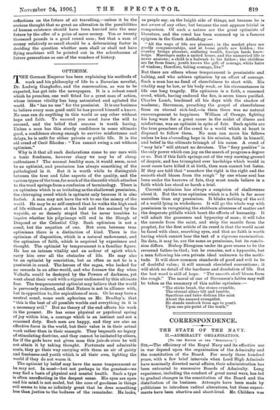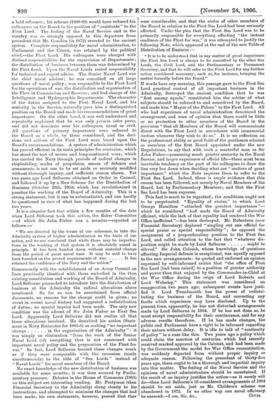CORRESPONDENCE.
THE STATE OF THE NAVY. II.—ADMIRALTY ORGANISATION.
[To THE EDITOR OF THE " SPECTATOR:] SIB,—The efficiency of the Royal Navy and its effective use in war depend upon the organisation of the Admiralty and the constitution of the Board. For nearly three hundred years, with a few brief intervals when Lord High Admirals have nominally directed naval affairs, their administration has been entrusted to auccessive Boards of Admiralty. Long experience, including the conduct of great naval ware, has led to gradual changes in the constitution of the Board and the distribution of its business. Attempts have been made by politicians to introduce radical alterations, but these experi- ments have been abortive and short-lived. Mr. Childers was
a hold reformer ; his scheme (1808-69) would have reduced his colleagues on the Board to the position of " assistants " to the First Lord. The feeling of the Naval Service and in the country was so strongly opposed to this departure from precedent that Mr. Goschen (in 1872) reverted to the ancient system. Complete responsibility for naval administration, to Parliament and the Crown, was retained by the political chief,—the First Lord. His colleagues were charged with distinct responsibilities for the supervision of Departments ; the distribution of business between them was determined by the First Lord. Upon the Naval Lords rested responsibility for technical and expert advice. The Senior Naval Lord was the chief naval adviser ; be was consulted on all large questions of naval policy ; was responsible to the First Lord for the operations of war, the distribution and organisation of the Fleet in Commission and Reserve ; and had charge of the Intelligence and Hydrographic Departments. The character of the duties assigned to the First Naval Lord, and his seniority in the Service, naturally gave him a distinguished position on the Board and made his recommendations of great importance. On the other baud, it was well understood and repeatedly explained that he was only primus inter pares, and did not dominate over his colleagues, naval or civil. All questions of primary importance were referred to the Board as a whole, by them considered, and the deci- sions and actions of the First Lord were based upon the Board's recommendations. A system of administration which has proved efficient in its main principles for centuries; which has stood the test of severe and long-continued wars; which has carried the Navy through periods of radical changes in shipbuilding, modes of propulsion, means of defence and armaments, is not one to be set aside or seriously modified without thorough inquiry, and sufficient reason shown. Yet two years ago Lord Selborne obtained an Order in Council, and followed it up by a New Scheme for the Distribution of Business (October 20th, 1904) which has revolutionised in practice the working of the Board of Admiralty. This is a strong statement, but it can be substantiated, and can hardly be questioned in view of what has happened during the last two years.
It is a singular fact that within a few months of the date when Lord Selborne took this action, the Esher Committee —of which Sir John Fisher was a member—reported as follows :— " We arc directed by the terms of our reference, to take the Admiralty system of higher administration as the basis of our action, and we are convinced that while there may be imperfec- tions in the working of that system it is absolutely sound in principle. It has been handed down without material change from the period of great naval wars. It may be said to have been founded on the proved requirements of war It has retained the confidence of the Navy and the nation."
Concurrently with the establishnient of an Army Council on lines practically identical with those embodied in the then existing constitution and working of the Board of Admiralty, Lord Selborne proceeded to introduce into the distribution of business at the Admiralty the radical alterations above mentioned. So far as can be ascertained from official documents, no reasons for the change could be given ; no event in recent naval history had suggested a redistribution of duties ; no special inquiry had been made. The only new condition was the advent of Sir John Fisher as First Sea Lord. Apparently Lord Selborne did not realise all that these alterations involved. He described his action (State- ment in Navy Estimates for 1905-6) as making "no important change in the organisation of the Admiralty ": it was simply an elimination "from the work of the Senior Naval Lord (of) everything that is not concerned with important naval policy and the preparation of the Fleet for war." In fact, Lord Selborne treated these changes much as if they were comparable with the reversion (made simultaneously) to the title of "Sea Lords" instead of "Naval Lords" for naval members of the Board.
No exact knowledge of the new distribution of business was available for some months ; it was then secured by Pails:- mentary pressure. Debates in the House of Commons (1905) on this subject are interesting reading. Mr. Pretyman (then Financial Secretary to the Admiralty) clung closely to his instructions, and attempted to minimise the changes that had beeri made; his own statements, however, proved that they
were considerable, and that the status of other members of the Board in relation to the First Sea Lord had been seriously affected. Under the plea that the First Sea Lord was to be primarily responsible for everything affecting "the instant readiness of the Fleet for war," it was attempted to justify the following Note, which appeared at the end of the new Table of Distribution of Business:— "It is to be understood that in any matter of great importance the First Sea Lord is always to be consulted by the other Sea Lords, the Civil Lord, and the Parliamentary or Permanent Secretary, and that he will refer to the First Lord for any further action considered necessary ; such as, for instance, bringing the matter formally before the Board."
If words have any meaning, this passage gave to the First Sea Lord practical control of all important business in the Admiralty, destroyed the ancient condition that he was "first among equals," constituted him the arbiter of what subjects should be referred to and considered by the Board, and made him "Mayor of the Palace" to the First Lord. All who had experience of naval administration denounced the arrangement, and were of opinion that there would be little or no protection to other members of the Board in the provision "that all Members of the Board will communicate direct with the First Lord in accordance with immemorial custom whenever they wish to do so." It is no reflection on the professional ability or good faith of the gentlemen selected as members of the first Board appointed under the new Regulations, to say that with such a masterful man as Sir John Fisher—possessing much greater seniority in the Naval Service, and larger experience of official life—there must be an inevitable tendency on the part of his colleagues to draw the line very low down when deciding what are "matters of great importance," which the Note requires them to refer to the First Sea Lord. Indeed, there is ample evidence that this course has been followed, not merely by Naval Members of the Board, but by Parliamentary Members ; and that the First Sea Lord has been supreme.
This fact is much to be regretted ; the conditions ought not to be perpetuated. "Equality of status," to which Lord George Hamilton "attached the greatest importance "- which he considered "had made the Board of Admiralty efficient, while the lack of that equality had rendered the War Office inefficient "—has been destroyed. Mr. Robertson (now Financial Secretary) deplored "singling out one official for special praise or special responsibility "; be opposed the assignment of a preponderating position to the First Sea Lord, and called attention to the fact that "whatever dis-
position might be made by Lord Selborne might be altered." Sir John Colomb, whose knowledge of questions affecting Imperial defence is exceptional, was equally opposed to the new arrangements : he quoted and endorsed an opinion expressed by well-informed critics that "the office of First Sea Lord [had been raised] to a position of greater authority and power than that enjoyed by the Commander-in-Chief at the War Office during the reign of Lord Roberts and Lord Wolseley." This statement was considered an exaggeration two years ago; subsequent events have justi- fied it. Lord Tweedmouth has the power of redistri- buting the business of the Board, and correcting any faults which experience may have disclosed. Up to the present time, apparently, he has not disturbed arrangements made by Lord Selborne in 1904. If he has not done so, he must accept responsibility for their continuance, and for any adverse results therefrom. If be has made changes, the public and Parliament have a right to be informed regarding their nature without delay. It is idle to talk of "continuity of policy" in a case like this. Two years ago a policy which could claim the sanction of centuries, which had recently received marked approval by the Cabinet, and had been made by the Government the model for War Office reconstitution, was suddenly departed from without proper inquiry or adequate reason. Following the precedent of thirty-five years ago, there ought to be a thorough and impartial inquiry into this matter. The feeling of the Naval Service and the opinions of naval administrators should be ascertained. If the result of an inquiry justifies the action—as it surely will do—then Lord Selborne's ill-considered arrangements of 1904 should be set aside, just as Mr. Childers's scheme was abandoned in 1872. In no other way can naval efficiency be ensured.—I am, Sir, &c.,















































 Previous page
Previous page